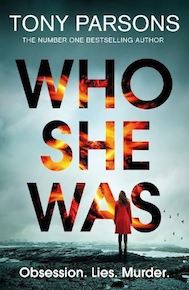When two Tony’s Meet: SHOTS’ Tony R. Cox asked Tony Parsons to talk about his new book, WHO SHE WAS …

Your massively successful debut is 23 years old now and you have had a book published almost annually. That’s an exceptional work rate. How do you keep it up?
Every time I finish a book I always think it will be the last one. Simply because it feels like the well has run dry and I will never have another idea in my life. Certainly with Who She Was I felt that way – and I would have been quite happy for this to be my last book as I like it so much. But gradually the water starts coming back into the well and you have more ideas – usually a collection of ideas coming together. Who She Was comes from spending a lot of time in Cornwall over the last few years, but it also comes from thinking about people trying to have a second chance at getting their life right. Also – writing books is my job. Or a big part of my job. So it is how I support my family and pay my way in the world. I do it because it is what I do, But like any job in the world, it will not last forever. I enjoy it while I can, and try to make the books stories that people will be glad they read.
Early on in Who She Was you explain why Tom left journalism – succinctly and incisively. Do you see other ‘old school’ (awful phrase, sorry) journalists moving away? Perhaps becoming fiction and non-fiction authors?
I think it is more like that old school journalists will simply die off. It is hard to write books – fiction or non-fiction. There are no guarantees for anyone – even if you have had success in the past. There is no certainty that there will be a deal waiting, or any money at all to be made. I have a reckless side to my nature – and an obsessive compulsion to tell stories – so nothing was ever going to stop me. But no – I can’t see print journalists all becoming authors when the curtain finally comes down on traditional media. My mum had six brothers and some of them were hot metal printers in Fleet Street. And of course there came a time in the Eighties when they all lost their jobs. I used to think that my uncles were unique but now think that it can happen to anyone in any profession – your skill set gets overtaken by time and technology. And suddenly you are a blacksmith or a milkman, and the world does not need you anymore.
Several of the main characters have firm views and language involving Cornwall and the Cornish individuality. Is this something you share?
I do think that Cornwall is unique – the end of the end. Its geography alone makes it different. And it is a very working class county – life has always been tough for the people who live here. They were miners, fishermen – hard jobs. But Cornwall is also a place where visitors flock – so inherently there is a tension. I always think of it as the gap between the people who catch the lobsters and the people who eat them. Big gap! And rich territory for anyone who wants to write about Cornwall. I don’t think it is a coincidence that so much great fiction – Winston Graham’s Poldark novels, Daphne du Maurier – has come out of Cornwall. And also of course it is stunning – the best beaches in the world, and I have seen them all from Australia to Thailand to the USA. Nowhere tops Cornwall.
How long did you spend researching this in Cornwall? Are there any people who have helped in particular that you could name?
I really feel like I spent my life researching Who She Was because some of my earliest memories are of starting out at Cornwall in the rain during the summer holidays of my childhood. But it is the last few years – pandemic and then post-pandemic – where the book really grew. I guess my wife Yuriko helped me more than anyone. She could not go back to her country for around four years – she is Japanese – and so she joined me in my obsessive love of Cornwall. I know that both of us will always return to Cornwall now. And the other great ally is Daphne du Maurier – she is probably my favourite author, so chasing her ghost was a big help. Looking for the beach in Rebecca was a big part of unlocking Who She Was.
Part of the characterisation rests on the link and the difference between deep lust and passionate love. You tackle that in detail and depth. Is this a particular interest?
Who isn’t interested in lust and love? I think the fascinating thing is that often one can be mistaken for the other. That’s when the fun really starts.
How important is it for the reader to have empathy with characters, as opposed to simply like or disliking them?
I think there is a degree of empathy needed – you want to spend time in this world. You want to drink Korev beer after hours at The Lobster Pot. You want to go to a lock-in after hours at The Rabbit Hole Pub. You want to go out at dawn to catch lobster on the Bonnie Bet. There is a degree of wanting to get lost in this imaginary world. But I don’t think you need to like the characters so much as you need to believe in them.
The psychological tension is almost wholly (the sea also plays a big role) about the relationship between the characters – namely their friendship – both males and females. How central is that relationship in your writing?
I think you need to come up with characters that live and breathe and have motivations that we can all understand in our human hearts. And if you do that, the story will tell itself. If you have a character who loves a woman who loves someone else – anyone can understand that. You just have to make it credible, and you need to make the reader care.
Do you have a special love for lobster and fresh fish? Have you been sea fishing?
I do have a love for lobster who has really developed in recent years. Nobody ate lobster where I grew up. The prawn cocktails of Essex only hinted at the magic of grilled fresh lobster. I love it now. And I did spend time with lobster fishermen in Cornwall for the book – I think I could have done with a bit more time on the water but – typically enough – some research days that were meant to be spent on the water were rained off. but that’s Cornwall. But the stuff in Who She Was about catching lobster for a living are my favourite parts of the book. I think I did a bad job of capturing that life – how hard it is, and how magical too.
Many thanks for your time and good luck with the new book.
Thanks!

Century (August 17, 2023) Hbk £16.99
Read SHOTS' review of WHO SHE WAS